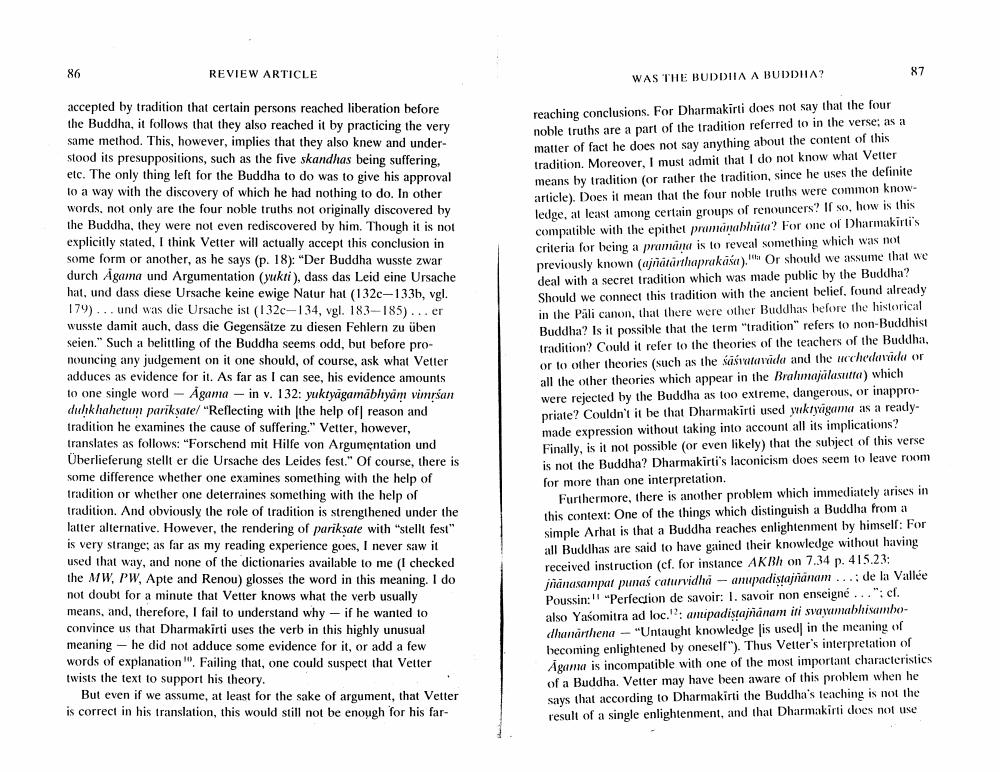Book Title: was The Buddha A Buddha Author(s): Eli Franco Publisher: Eli Franco View full book textPage 4
________________ 86 REVIEW ARTICLE WAS THE BUDDIA A BUDDHIA? accepted by tradition that certain persons reached liberation before the Buddha, it follows that they also reached it by practicing the very same method. This, however, implies that they also knew and understood its presuppositions, such as the five skandhas being suffering. etc. The only thing left for the Buddha to do was to give his approval to a way with the discovery of which he had nothing to do. In other words, not only are the four noble truths not originally discovered by the Buddha, they were not even rediscovered by him. Though it is not explicitly stated, I think Vetter will actually accept this conclusion in some form or another, as he says (p. 18): "Der Buddha wusste zwar durch Agama und Argumentation (yukti), dass das Leid eine Ursache hat, und dass diese Ursache keine ewige Natur hat (132c-133h, vgl. 179) ... und was die Ursache ist (132-134, vgl. 183-185)...er wusste damit auch, dass die Gegensätze zu diesen Fehlern zu üben seien." Such a helittling of the Buddha seems odd, but before pronouncing any judgement on it one should, of course, ask what Vetter adduces as evidence for it. As far as I can see, his evidence amounts to one single word - Agama - in v. 132: yuktyagamabhyam vimran dulkhahetum pariksate/ "Reflecting with the help of reason and tradition he examines the cause of suffering." Vetter, however, translates as follows: "Forschend mit Hilfe von Argumentation und Überlieferung stellt er die Ursache des Leides fest. Of course, there is some difference whether one examines something with the help of tradition or whether one deterraines something with the help of tradition. And obviously the role of tradition is strengthened under the latter alternative. However, the rendering of puriksate with "stellt fest" is very strange; as far as my reading experience goes, I never saw it used that way, and none of the dictionaries available to me (I checked the MW, PW, Apte and Renou) glosses the word in this meaning. I do not doubt for a minute that Vetter knows what the verb usually means, and, therefore, I fail to understand why - if he wanted to convince us that Dharmakirti uses the verb in this highly unusual meaning - he did not adduce some evidence for it, or add a few words of explanation". Failing that, one could suspect that Vetter twists the text to support his theory. But even if we assume, at least for the sake of argument, that Vetter is correct in his translation, this would still not be enough for his far reaching conclusions. For Dharmakirti does not say that the four noble truths are a part of the tradition referred to in the verse: as a matter of fact he does not say anything about the content of this tradition. Moreover, I must admit that I do not know what Vetter means by tradition (or rather the tradition, since he uses the definite article). Does it mean that the four noble truths were common knowledge, at least among certain groups of renouncers? If so, how is this compatible with the epithel prim hluta? For one of Dharmakirtis criteria for being a pramana is to reveal something which was not previously known (ajnátúrthaprakaśc). Or should we assume that we deal with a secret tradition which was made public by the Buddha? Should we connect this tradition with the ancient belief, found already in the Pali canon, that there were other Buddhas before the historical Buddha? Is it possible that the term "tradition" refers to non-Buddhist tradition? Could it refer to the theories of the teachers of the Buddha, or to other theories (such as the sostenvida and the nicchiedonvidu or all the other theories which appear in the Bralmajálasulla) which were rejected by the Buddha as too extreme, dangerous, or inappropriate? Couldn't it be that Dharmakirti used yuktyvigama as a readymade expression without taking into account all its implications? Finally, is it not possible (or even likely) that the subject of this verse is not the Buddha? Dharmakirtis laconicism does seem to leave room for more than one interpretation. Furthermore, there is another problem which immediately arises in this context: One of the things which distinguish a Buddha from a simple Arhat is that a Buddha reaches enlightenment by himself: For all Buddhas are said to have gained their knowledge without having received instruction (cf. for instance AK Bh on 7.34 p. 415.23: jnanasampal punaś caturvidhå -- anupadistajranam ... de la Vallée Poussin: "Perfection de savoir: I. savoir non enseigné...": cf. also Yaśomitra ad loc.: amipadistajránam ili svarvamabhisambodhanarthena - "Untaught knowledge is used in the meaning of becoming enlightened by oneself"). Thus Veller's interpretation of Agama is incompatible with one of the most important characteristics of a Buddha. Vetter may have been aware of this problem when he says that according to Dharmakirti the Buddha's teaching is not the result of a single enlightenment, and that Dharmakirti does not usePage Navigation
1 2 3 4 5 6 7 8 9 10
